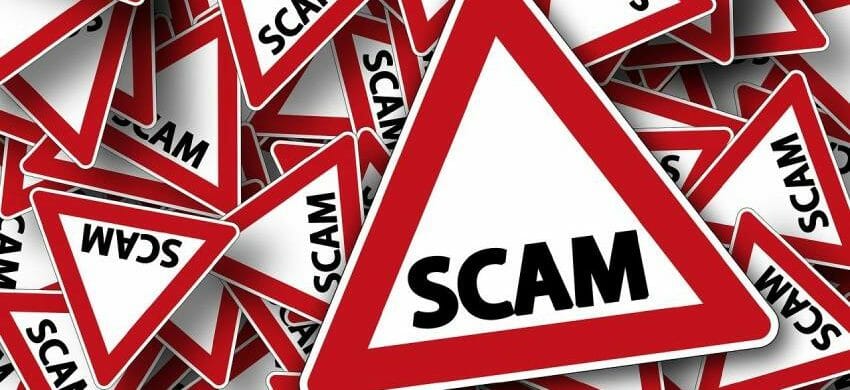Last Updated: January 03, 2024
Stay Alert for Seasonal Swindles

Experts are expecting fewer people will brave brick and mortar stores this year because of the pandemic. E-commerce sales are expected to grow by at least 25% and online sales are already 27% higher than they were a year ago.
Unfortunately, with more online shopping comes more scams. Scamming is expected to grow at least as much as online shopping. Scammers have several ways to go after your personal information. One way is through emails and another is through fake websites. How can you keep yourself safe while you are cruising through the web looking for the best holiday deals?
Five Major Red Flags To Watch Out For:
1) Emails
It is cheap and easy to buy email addresses and then send them out messages. If you get an email from a retailer like Apple, Fed Ex, Paypal notifying you that there is a problem with your account, it is more than likely from a scammer. DO NOT click on any links within that email. Your information will get stored and you can kiss your money and your privacy goodbye.
Sure it looks legit. Check the sender’s name to see if it matches what you would expect. Hover over the name associated in the body of the email and the actual address will appear. “Costco” just sent me a reward but the email address is reply@gru.denxx.com. Looks like a real Costco ad, but it is a phishing scam. The sender’s email address was sent from a domain that doesn’t match the company name at all.
If you think it may be a real email, open up an internet browser and go to the website yourself by typing or selecting the real URL, then log into your account from there to see if you have any messages or notifications.
2) Urgent Emails
Urgent emails are even more of a scam alert than regular emails. If it is urgent or immediate or limited time, someone wants your information for fraudulent reasons. Asking for charity or donations can be another scam. Always go directly to the verified website to donate.
3) What a deal
The old saying “if it’s good to be true it probably is” works for online purchasing as well. If you know an item’s worth and you suddenly find it for far less, you’ve either got a scam or a knock off.
For a while, Facebook had an in-feed ad that listed many friends as members and some incredible deals. Once you signed up for this, literally thousands of emails arrived in your inbox and your email address was sold to many less-than-reputable companies for marketing purposes.
If you are offered a “free” subscription to a site that is normally subscription-based, it is more than likely a scam. Gift cards can be another scam. Buying them online from sellers on eBay-type websites can almost guarantee you an empty or expired gift card.
4) Fake Websites
Setting up a website that looks just like the real thing is actually pretty easy. For instance, you may have a fake eBay site or there may be fake sites listed on a reputable seller like Amazon.
Look for the following red flags:
- unusually low prices
- no reviews or 100% positive reviews
- poor grammar or spelling
- no SSL (the padlock that appears in the address bar or https: )
- no contact addresses or physical addresses
- no or bad terms and conditions
Another red flag is that the shipping keeps getting delayed – you may need to cancel the order right away. You can also Google the website and see if it has been flagged.
5) Request for Private Information
Do not ever give out your personal information like passwords, social security number, address, voter affiliation, etc without thinking WHY the website needs that information. Likewise, don’t enter your credit card or debit card unless you have verified the webpage!
Tips To Help You Avoid Scams
Being alert to emails and web pages is important.
Here a few actions to help keep you safe:
- Comparison Shop – find the item and then put the same make and model into your search bar. You’ll get a good idea of how much an item sells for and whether or not you are getting an unbelievable “deal.” Always check prices with shipping charges as well. That low price may have a high shipping cost.
- Buy With A Credit Card – don’t use your debit card for online purchases. There are several reasons for this. First, if you use your debit card and it is hacked, you can lose all the money in your checking account before you are even aware of the theft. Set a daily spending limit on your debit card through your bank to keep from losing more than you can afford. Remember that most credit cards come with fraud protection and additional warranties.
- Check Your Credit Card Statements – keep an eye out for odd purchases or increased credit limits. You can dispute any odd charges. An unnoticed credit increase can lead to unnoticed theft.
- Prepaid Credit Cards – consider using prepaid credit cards to make online purchases. That way you can only spend what is on the card and scammers can’t make additional purchases.
- Always Check the Country of Origin – buying items from different countries can be a recipe for fraud or scams. In addition, ordering electronic items from another country means that it won’t work well in the US and CDs/DVDs from one country may not play on American machines.
- Choose Reputable Sellers – use the red flags we listed under the Websites section above to help you choose sellers who have a good reputation.
If you have overused your credit cards and are having trouble making even your minimum payments, the debt specialists at Pacific Debt Inc. may be able to help you pay off your debt and learn to live debt-free.
Common Scams to Watch Out For
While holiday scams may be seasonal, fraudsters employ cons year-round that consumers should be aware of.
Some of the most common scams include:
- Phishing - Fake emails or texts pretending to be from a trusted source to trick you into revealing passwords, account numbers or other sensitive information. These messages often have typos and bad grammar.
- Identity Theft - Scammers steal your personal information to open fraudulent credit cards or drain your existing accounts. Monitoring your credit reports regularly can help catch this early.
- Tech Support Scams - You may receive a call claiming to be from well-known tech companies stating your computer has a virus. The goal is to gain remote access or make you pay for useless services.
- Romance Scams - Fraudsters create fake dating profiles and build relationships to eventually ask for money. Reverse image searches can help reveal if profile photos are stolen.
- Government Imposter Scams - The scammer pretends to be from the IRS, Social Security or other agencies and threatens dire consequences if you do not pay alleged fines or taxes right away.
- Fake Check Scams - Scammers pay you with a fake check and tell you to wire money back to them. Then the original check bounces leaving you liable for the wired money.
Being able to recognize these common scams makes it much less likely you'll be victimized by one.
Security Resource Recommendations
Equipping yourself with the right security tools significantly decreases your vulnerability to scams and fraud.
- Password Managers – Tools like 1Password, LastPass and Bitwarden generate strong, unique passwords for every account. Some even store sensitive documents.
- Credit Monitoring – IdentityForce, LifeLock and Credit Karma all provide daily credit reports from major bureaus and alerts for suspicious activity.
- VPNs – Encrypt your web traffic from snoops on public Wi-Fi with trusted providers like ExpressVPN, NordVPN or TunnelBear.
- Secure Browsers – The Brave browser blocks ads and trackers that could expose your data while the Tor browser enables anonymous web surfing.
FAQs
Conclusion
Staying vigilant against increasingly crafty fraudsters is crucial to protecting your hard-earned money and sensitive personal information this holiday season. Arm yourself with awareness of seasonal scams, learn to recognize signs of phishing attempts across all communication channels, and don't let appealing deals or requests cloud your judgment.
Implementing proactive precautions can provide peace of mind amid elevated risks. Should the unfortunate still occur, act swiftly to engage the proper recovery resources.
Never hesitate to seek assistance whether from fraud resolution specialists or debt relief services should financial hardship arise. Keep this guidance front of mind, share with loved ones, and together enjoy safer and happier holidays ahead.
Pacific Debt, Inc
If you’d like more information on how to get out of debt, we are happy to help. We will explain all your options and help you decide which is the best option for you. We can even refer you to trusted partners who may be able to better meet your needs.
If you have more questions, contact one of our
debt
specialists today.
Reduce Your Credit Card Debt By Up to Half

BBB Reviews | 4.9/5.0 Rating









 Do Not Sell My Personal Information
Do Not Sell My Personal Information